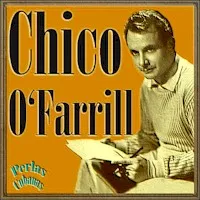Time: 27:28
Size: 62.9 MB
Styles: Latin rhythms
Year: 2015
Art: Front
[2:54] 1. La Malagueña
[2:54] 2. Siboney
[2:55] 3. La Bella Cubana
[2:15] 4. Madrid
[2:39] 5. Bahia
[2:47] 6. Almendra
[2:44] 7. La Camparsa
[2:41] 8. La Cucaracha
[3:02] 9. La Margarita
[2:33] 10. El Manisero
Chico O'Farrill was right in the thick of the Afro-Cuban and Latin waves that hit jazz in the late '40s and '50s. His sophisticated writing for Latin big bands of the early '50s was often bold, brassy, and tense, yet he could also achieve a delicate, almost classical ambience in such pieces as "Angels' Flight" and work capably in larger forms (the groundbreaking "Afro-Cuban Jazz Suites").
O'Farrill took up the trumpet while in military school in Georgia, returning to Cuba as a full-fledged jazz fan after hearing the top American big bands. He studied composition in his native Havana and led his own band there before moving to New York City in 1948, where he soon made a name for himself writing music for Benny Goodman ("Undercurrent Blues"), Stan Kenton ("Cuban Episode"), and Machito ("Afro-Cuban Jazz Suite"). From 1950 to 1954, O'Farrill made six fiery 10" albums of Latin and American big band jazz for Clef and Norgran, all of which have been reissued on a Verve two-CD set, Cuban Blues. He also appeared with his own band at Birdland and toured the U.S. Toward the end of the decade, he moved to Mexico City, returning to New York in 1965 to work as arranger and music director of the TV series Festival of the Lively Arts and to write arrangements for Count Basie. O'Farrill also put his classical training to use by writing pieces for symphony orchestra such as "Three Cuban Dances" and "Symphony No. 1." Though he continued to write pieces for Machito, Kenton, Gato Barbieri, and Dizzy Gillespie into the '70s, there were no recording sessions under O'Farrill's name from 1966 until 1995, when he came roaring back on the scene, his imagination and vigor miraculously intact, with the outstanding Pure Emotion CD (Milestone). He recorded two more strong albums for Milestone, the last being Carambola, released in October 2000. Eight months later, on June 27, 2001, Arturo "Chico" O'Farrill died while hospitalized in New York. ~bio by Richard S. Ginnell
O'Farrill took up the trumpet while in military school in Georgia, returning to Cuba as a full-fledged jazz fan after hearing the top American big bands. He studied composition in his native Havana and led his own band there before moving to New York City in 1948, where he soon made a name for himself writing music for Benny Goodman ("Undercurrent Blues"), Stan Kenton ("Cuban Episode"), and Machito ("Afro-Cuban Jazz Suite"). From 1950 to 1954, O'Farrill made six fiery 10" albums of Latin and American big band jazz for Clef and Norgran, all of which have been reissued on a Verve two-CD set, Cuban Blues. He also appeared with his own band at Birdland and toured the U.S. Toward the end of the decade, he moved to Mexico City, returning to New York in 1965 to work as arranger and music director of the TV series Festival of the Lively Arts and to write arrangements for Count Basie. O'Farrill also put his classical training to use by writing pieces for symphony orchestra such as "Three Cuban Dances" and "Symphony No. 1." Though he continued to write pieces for Machito, Kenton, Gato Barbieri, and Dizzy Gillespie into the '70s, there were no recording sessions under O'Farrill's name from 1966 until 1995, when he came roaring back on the scene, his imagination and vigor miraculously intact, with the outstanding Pure Emotion CD (Milestone). He recorded two more strong albums for Milestone, the last being Carambola, released in October 2000. Eight months later, on June 27, 2001, Arturo "Chico" O'Farrill died while hospitalized in New York. ~bio by Richard S. Ginnell
Perlas Cubanas


No comments:
Post a Comment
ALWAYS include your name/nick/aka/anything!